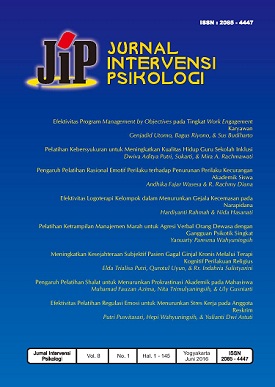Main Article Content
Abstract
As the purpose of this study was to investigate the effect of shalat's training to lower on student academic procrastination. The hypothesis is no effect of a decrease in academic procrastination among students who attend training shalat with students who are not trained to shalat. This study uses pretest and posttest control group design, in which the research subjects are students from various departments at "Y" University in Yogyakarta a total of 8 people, with 4 people in the experimental group and 4 people in the control group.This study uses a scale of academic procrastination compiled by Siswanto (2013). Data were analyzed using non-parametric statistics, the Wilcoxon sign rank test. The results of the research in the experimental group for differences pre and post test obtained value Z =-0.368, p = 0.713 (p>0.05). As for differences in pre-test and post-test in the control group, the value of Z = -l.826, p = 0.068 (p>0.05). It can be concluded that there is no difference in academic procrastination before and after the shalat's training. Thus, the research hypothesis was rejected.
Keywords: Academic Procrastination, Shalat's Training
Article Details
Authors who publish with this journal agree to the following terms:
- Authors retain copyright and grant the journal right of first publication with the work simultaneously licensed under a Creative Commons Attribution-ShareAlike 4.0 International License that allows others to share the work with an acknowledgment of the work's authorship and initial publication in this journal.
- Authors are able to enter into separate, additional contractual arrangements for the non-exclusive distribution of the journal's published version of the work (e.g., post it to an institutional repository or publish it in a book), with an acknowledgment of its initial publication in this journal.
- Authors are permitted and encouraged to post their work online (e.g., in institutional repositories or on their website) prior to and during the submission process, as it can lead to productive exchanges, as well as earlier and greater citation of published work (See The Effect of Open Access).




